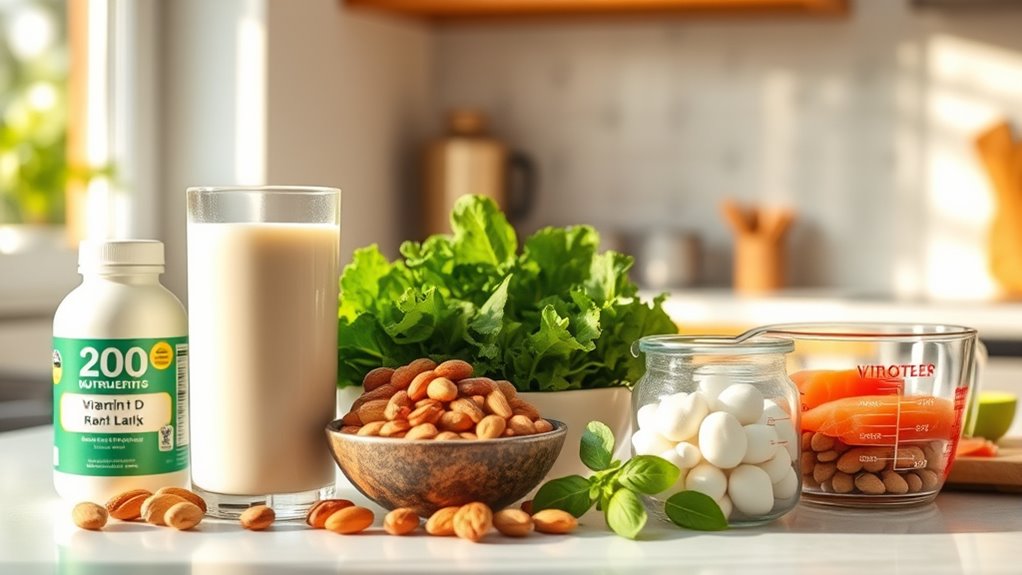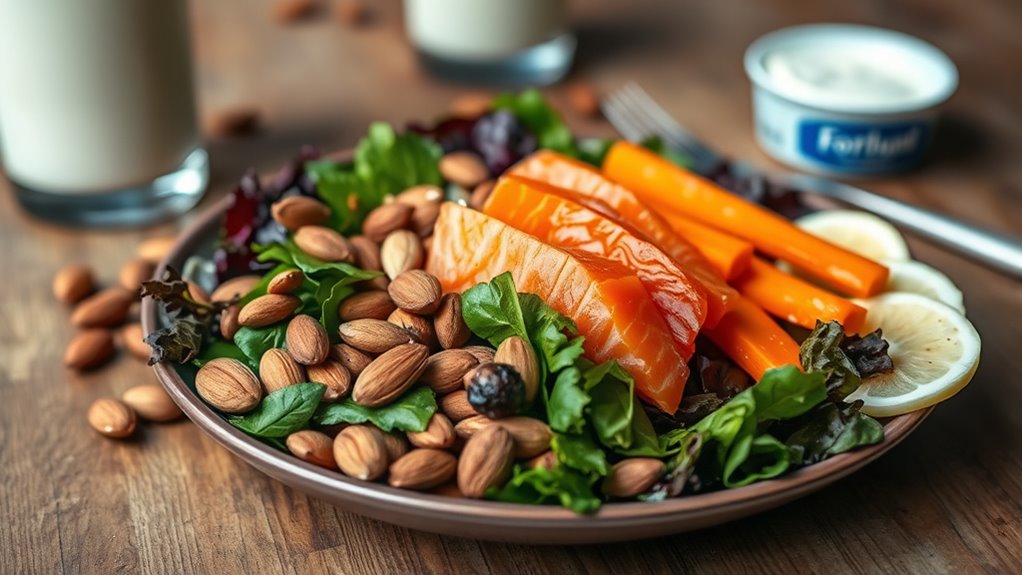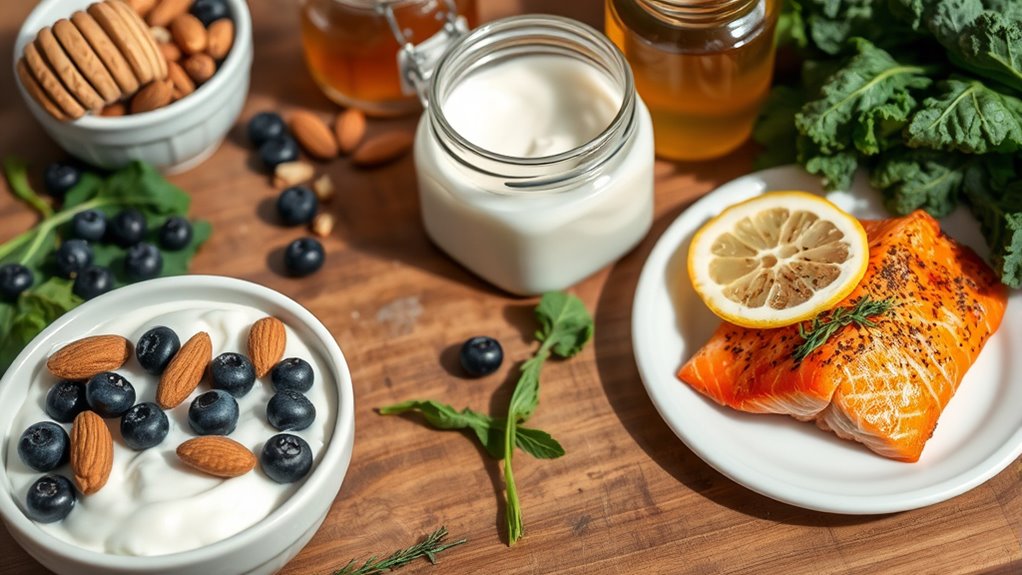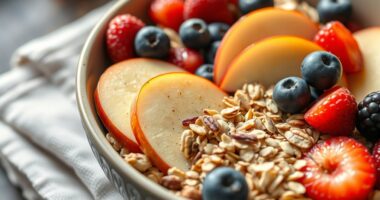To maintain strong bones, focus on a nutrient-rich diet that includes plenty of vegetables, fruits, whole grains, lean proteins, and low-fat dairy. Make sure to get enough calcium (1000-1300 mg daily), vitamin D (600-800 IU), and vitamin K to support bone mineralization. Limit processed foods, excessive caffeine, and alcohol, which can harm bone health. Combining good nutrition with weight-bearing exercises boosts strength. Keep examining these strategies to learn how to optimize your skeletal health.
Key Takeaways
- Consume adequate calcium (1000-1300 mg daily) from dairy, leafy greens, fortified foods, and fish with bones to support bone mineralization.
- Ensure sufficient vitamin D intake (600-800 IU daily) through fortified foods, fatty fish, sunlight, and supplements if necessary.
- Incorporate vitamin K-rich foods like leafy greens to activate osteocalcin and enhance bone matrix quality.
- Include diverse protein sources, both animal and plant-based, to supply essential amino acids for bone repair and maintenance.
- Maintain a nutrient-dense, plant-based diet combined with weight-bearing exercises and healthy lifestyle habits to optimize bone density.
Emphasizing Nutrient-Rich Dietary Patterns for Bone Health

To maintain strong bones, you should focus on adopting nutrient-rich dietary patterns that emphasize fruits, vegetables, whole grains, lean proteins, and low-fat dairy. These foods provide essential vitamins, minerals, and phytochemicals that support bone density and reduce fracture risk. Incorporate a variety of colorful produce, aiming for at least four servings of vegetables and three of fruit daily. Choose whole grains like brown rice and whole wheat pasta, which supply magnesium and fiber. Include lean proteins such as fish, poultry, beans, and nuts, which help build and maintain bone strength. Low-fat dairy products—milk, yogurt, cheese—offer calcium and protein. Limiting processed foods, sweets, and refined grains improves nutrient intake and promotes overall bone health. Consistent dietary habits play a crucial role in long-term bone maintenance. Additionally, engaging in aquatic exercise can enhance bone strength through weight-bearing activities in a low-impact environment. Incorporating adequate vitamin D intake, whether through diet or sunlight exposure, further supports calcium absorption and bone health.
Key Micronutrients: Calcium, Vitamin D, and Vitamin K

Calcium, vitamin D, and vitamin K work together to maintain and enhance bone health, each playing a essential role in preserving bone density and preventing fractures. Calcium is the main mineral in bones, providing strength and structure, but it works best when combined with other nutrients. Vitamin D helps your body absorb calcium efficiently, reducing fracture risk and supporting bone mineralization. Vitamin K is critical for activating osteocalcin, a protein that binds calcium in the bone matrix, improving bone quality and reducing fractures. Studies show that supplementing all three together produces greater bone density improvements and fracture prevention than any nutrient alone. This synergistic approach strengthens bones at key sites, making it an effective, cost-efficient strategy to support skeletal health and reduce osteoporosis risk.
The Impact of Protein Sources on Bone Maintenance

Both animal and plant proteins can support bone maintenance, but their effects may differ based on their amino acid profiles and nutrient interactions. High-quality animal proteins, like dairy and lean meats, provide essential amino acids that promote bone health, especially when combined with calcium and vitamin D. Plant proteins also contribute to bone health, though they may vary in amino acid content; pairing them with other plant sources can improve their benefits. Increasing protein intake above the RDA, especially in older adults, is linked to higher bone mineral density and reduced fracture risk. Consuming a balanced mix of protein sources, along with adequate nutrients, enhances muscle strength and loading, which further supports bone maintenance. Proper nutrition and a diverse diet are essential for maintaining optimal bone health. Additionally, incorporating diverse plant-based protein sources can offer complementary nutrients that support overall skeletal strength. Ensuring a nutrient-rich diet can optimize the synergistic effects of these proteins on bone health. Maintaining adequate protein intake is also crucial for stimulating osteoblast activity and promoting bone regeneration. Consuming a variety of protein sources can enhance the bioavailability of key nutrients, ensuring the body efficiently utilizes amino acids and minerals necessary for bone repair and growth. Always guarantee your diet maintains this nutritional synergy for ideal bone health.
Avoiding Dietary Factors That Harm Bone Density

Certain dietary habits can profoundly impair your bone health, especially if you consume excessive amounts of specific nutrients. High sodium intake from processed and fast foods increases urinary calcium excretion, leading to bone calcium loss and lower bone mineral density. Reducing sodium helps maintain calcium balance and reduces osteoporosis risk. Consuming too much refined sugar and sugary drinks promotes calcium excretion, interferes with absorption, and fuels systemic inflammation, all damaging bone strength. Excessive alcohol consumption decreases bone formation, increases resorption, and disrupts calcium and vitamin D metabolism, weakening bones over time. High caffeine intake may modestly boost calcium loss, especially if your calcium intake is inadequate. Finally, diets rich in acid-producing animal proteins without enough alkaline-rich fruits and vegetables can stimulate bone resorption, risking net bone loss. Avoiding these factors supports healthier bones.
Practical Strategies for Calcium and Vitamin D Intake

To effectively support your bone health, focus on maximizing your intake of calcium and vitamin D through practical dietary and lifestyle choices. Aim for 1000 to 1300 mg of calcium daily from sources like dairy products, leafy greens, fortified plant milks, and fish with edible bones. For vitamin D, target 600 to 800 IU per day, obtained from fortified foods, fatty fish, egg yolks, and sensible sunlight exposure. Supplements can help if your diet or sun exposure is limited, especially for older adults. Be cautious with high-dose vitamin D supplements—doses above 4000 IU don’t improve bone density and may cause harm. Regularly monitoring your intake ensures you meet, but do not exceed, recommended levels for ideal bone preservation. Incorporating nutritional strategies that include the right balance of calcium and vitamin D can significantly enhance your bone health and reduce the risk of osteoporosis. Additionally, choosing appropriate exercise such as weight-bearing and resistance training can further support bone strength and density. Understanding the importance of relationships in overall well-being can motivate better self-care habits that benefit your skeletal health.
The Role of Dietary Quality Scores in Bone Preservation

Dietary quality scores provide a practical way to evaluate how well your diet supports bone health. Scores like the Healthy Eating Index (HEI) and Dietary Quality Index (DQI) measure adherence to nutrient-rich, bone-friendly patterns. Research shows that higher scores link to better bone mineral density (BMD), especially in postmenopausal women, reducing osteoporosis risk. These scores are based on dietary patterns emphasizing fruits, vegetables, whole grains, lean proteins, and low-fat dairy, while limiting processed foods and sugar. Using food frequency questionnaires, clinicians can assess your diet’s quality and guide improvements. Long-term adherence to high-quality diets across your life correlates with healthier bones later on. Overall, dietary quality scores serve as effective tools to support your efforts in maintaining strong, resilient bones through better nutrition.
Benefits of Plant-Based Foods and Whole Grains

Incorporating plant-based foods and whole grains into your diet can support strong bones when planned carefully. They provide essential nutrients like magnesium, antioxidants, and fiber that promote bone health. To maximize benefits:
- Choose calcium-rich options such as fortified plant milks, tofu, and leafy greens with low oxalate levels, improving absorption.
- Include whole grains like oats, brown rice, and quinoa to supply magnesium and trace minerals crucial for bone mineralization.
- Consume a variety of vegetables and fruits for vitamins K1, C, and antioxidants, which protect against oxidative stress and support bone density. Incorporating a diverse range of nutrient sources aligns with nutritional strategies recommended for optimal skeletal health.
- Selecting vetted products specifically formulated for safety and efficacy can help ensure you meet your nutritional needs more effectively.
- Incorporating plant-based diets that emphasize diverse nutrient sources can further enhance bone strength and overall skeletal health.
While plant-based diets may require mindful planning to ensure adequate calcium and vitamin D, they can reduce osteoporosis risk and promote overall skeletal health with balanced choices.
Emerging Research on Flavanols and Bone Remodeling

Recent research reveals that flavanols actively influence bone remodeling by modulating key cellular signaling pathways such as MAPK, NF-kβ, Wnt/β-catenin, and BMP2/SMAD. These compounds help balance osteoblast and osteoclast activity, essential for maintaining strong bones. Flavanols reduce inflammation by lowering cytokines that promote bone resorption, while their antioxidant properties protect cells from oxidative stress. They also regulate epigenetic mechanisms, influencing gene expression related to bone cell differentiation and survival. Additionally, flavanols stimulate osteogenic differentiation, upregulating markers like Runx-2, ALP, and osteocalcin, and promote angiogenesis through VEGF and ANG-1, supporting bone repair. Their ability to inhibit osteoclast activity and reduce oxidative damage positions flavanols as promising agents for preventing bone loss and enhancing skeletal health.
Integrating Nutrition With Lifestyle for Optimal Bone Strength

To maximize bone strength, you need to combine good nutrition with healthy lifestyle habits. Eating nutrient-rich foods like fruits, vegetables, and lean proteins supports your bones, but staying active and avoiding harmful behaviors is equally important. When you integrate these elements, you create a powerful approach to maintaining strong, healthy bones throughout your life. Incorporating best practices for bone health can further enhance your efforts and ensure long-term benefits. Additionally, maintaining proper calcium and vitamin D levels is crucial for optimal bone mineralization and strength. Staying informed about symptoms of breast cancer and early detection strategies can help you make better decisions about health-related technologies and innovations. Using appropriate headphone jacks and maintaining your equipment properly can also ensure clear communication and reduce distractions, supporting your overall wellness journey.
Nutrients Supporting Bone Health
Have you ever wondered how your diet can directly influence your bone strength? The right nutrients are essential for maintaining healthy bones. Here are three key nutrients to focus on:
- Calcium – It makes up 60-70% of bone weight and is crucial for bone density. Adequate intake supports bone homeostasis, but absorption can decrease with age. Incorporating nutrients supporting bone health can optimize calcium utilization.
- Vitamin D – It helps your body absorb calcium efficiently. Without enough vitamin D, bones may become weak and prone to fractures.
- Vitamin K – It activates osteocalcin, a protein that binds calcium to the bone matrix, promoting mineralization and strength. Incorporating vertical storage solutions and organized spaces can also support a healthier lifestyle for overall well-being.
Consuming these nutrients through diet or supplements, along with a balanced lifestyle, helps preserve bone density and reduce fracture risk.
Lifestyle Habits for Density
Combining healthy lifestyle habits with proper nutrition creates a powerful approach to maintaining and improving bone density. Regular physical activity, like weight-bearing and resistance exercises, stimulates bone growth and reduces loss. Incorporate balance and flexibility training, such as yoga, to lower fall risk. Avoid smoking and limit alcohol, as both negatively impact bone health by disrupting hormones and calcium absorption. Maintaining a balanced diet rich in fruits, vegetables, and dairy supports bone integrity. Use the following table to see how these habits work together:
| Habit | Benefit |
|---|---|
| Exercise (weight-bearing) | Stimulates bone formation |
| Smoking & alcohol | Increase fracture risk, impair bone maintenance |
| Healthy diet | Provides essential nutrients for bones |
| Fall prevention | Reduces injury risk, supports bone safety |
Together, these habits optimize your bone strength and longevity.
Frequently Asked Questions
How Does Alcohol Consumption Affect Bone Density?
You might wonder how alcohol affects your bones. Excessive drinking, especially over three drinks daily, inhibits bone-building cells called osteoblasts, disrupts calcium and vitamin D balance, and raises fracture risk. Light to moderate intake, like one or two drinks per day, shows mixed results—some studies suggest it could slightly increase or decrease BMD. To protect your bones, it’s best to limit alcohol and focus on a balanced diet with calcium and vitamin D.
Can Dietary Supplements Fully Replace Nutrient-Rich Diets for Bone Health?
You might think supplements can totally replace your nutrient-rich diet, but that’s like trying to build a castle with just a single brick. Supplements focus on a few nutrients, ignoring the synergy and balance found in real food. Without the variety of vitamins, minerals, and phytochemicals from whole foods, your bones miss out on essential support. A balanced diet always beats relying solely on pills for true, lasting bone health.
What Is the Optimal Daily Calcium Intake for Different Age Groups?
You need to know the ideal calcium intake for your age to support healthy bones. Infants 0-12 months require about 200-270 mg daily, while children aged 1-8 should get 500-1,000 mg. Teens need around 1,300 mg, and adults 19-50 should aim for 1,000 mg. Older adults, especially women over 50, need 1,200-1,300 mg daily. Meeting these amounts helps prevent osteoporosis and fractures later in life.
Are Plant-Based Proteins as Effective as Animal Proteins for Bone Maintenance?
You wonder if plant-based proteins are as effective as animal proteins for bone maintenance. Research shows that while animal proteins generally support higher bone mineral density, plant proteins like soy still offer beneficial nutrients and sulfate levels that can help. If you balance your diet with adequate calcium and vitamin D, and include diverse plant proteins, you can support your bone health, though some evidence suggests animal proteins may have a slight advantage.
How Do Specific Dietary Patterns Influence Fracture Risk Over Time?
Ever wonder how your eating habits impact your fracture risk? You can lower it by adopting healthy dietary patterns rich in fruits, vegetables, whole grains, fish, nuts, legumes, and low-fat dairy. These foods supply essential minerals and nutrients, like calcium and vitamin D, that strengthen your bones over time. Conversely, diets high in sugary, fried, or processed foods can weaken your bones and increase your fracture risk, especially as you age.
Conclusion
By nourishing your body with nutrient-rich foods and embracing healthy habits, you’re building a fortress of strength that stands tall against time. Think of your bones as a garden—you’re the gardener, tending with calcium, vitamin D, and vibrant plant-based foods to keep it lush and resilient. Stay proactive, avoid harmful habits, and blend good nutrition with active living. With each mindful choice, you’re painting a masterpiece of lasting bone health that stands the test of time.









